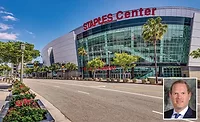Preparing Proactive Sports Security
“Sport reflects both good and bad aspects of our broader society, whether economic or political issues are in play. The fan that buys a ticket may feel with or against the team, entitled or angry; often as a result of the broader societal environment,” explains Dr. Lou Marciani, Director of the National Center for Spectator Sports Safety and Security. The work at NCS4 primarily benefits its members, professional leagues and division one universities, individual teams and venues. Ultimately, NCS4 serves the fans by providing safety for the enjoyment of spectator events.
Sport has complexities and politics just like any other business sector. For example, the New York Giants and New York Jets are members of the National Football League and play their games at the Met Life Stadium in New Jersey. Thus, you have two member teams, the league and the venue working to deliver a safe and secure event. The teams deal with different issues, such as away games. The league deals with its members at a policy level. And the venue integrates around the actual event, which may be an NFL game one week and a concert the next.
NCS4’s work correlates to the broader security profession. “The biggest change has been educating fans and changing the perception of acceptable behavior. Balancing the right level of security that a fan or customer will tolerate against ensuring a safe and secure environment at these mass population events is a science,” Dr. Marciani says. “Our focus is on risk management so that bad things do not happen.” We have seen the same dynamics with employees and stakeholders across all sectors, from agriculture to utilities.
However, the biggest challenge is complacency. NCS4 works hard to help its members keep their stakeholders motivated. “These organizations have to integrate people, processes and technologies,” Dr. Marciani says. “And that requires investment. I worry that funding for a university, like ours, could be reduced. Just like a corporation could cut spending for risk management and security. All organizations really need to be prepared and that requires funding for planning and training.”
Among NCS4’s biggest programs is the creation of a stadium evacuation modeling system. This system allows for the testing of evacuation plans at large venues, which cannot be tested realistically. “Weather is the most frequent event our members face, especially in outdoor venues such as golf. Having a ‘shelter in place’ program is critical for fan safety,” Dr. Marciani says.
Metrics are key component of the organization’s work too. “We created the Institute for the Study of Sports Incidents with New Haven University (Connecticut),” Dr. Marciani explains. “We are working together to collect incident data at venues for study and reporting. This is the first such program to measure the size of the problem sports security programs are trying to address. This will enable our members to develop best practices, risk and security programs based on actual data.”
“We review the security process from start to finish with our member organizations. From the rules around evicting fans, allowing them back and the legal issues around that. How teams and venues set policy, administer that policy and react to incidents is important to understand,” he says. The reality is that there are different policies and rules in effect at different venues. Dr. Marciani credits the NFL as a leader, “The NFL’s Code of Conduct outlines acceptable behavior across all NFL venues. And fans have responded appropriately for the most part.”
“Our support from DHS continues to be strong and expanding,” he adds. “Our work with FEMA for simulated, ‘what if’ scenarios allowing members to focus on critical situations has been vital. The laboratory at NCS4 to demonstrate and test technologies that solve problems has been a major plus for this sector. And the upcoming work to measure actual incidents, study them and identify best practices will be ground breaking.”
“It is important to also note the impact of ‘See Something, Say Something.’ Everyone is a first responder now,” he says. “We have changed our culture significantly since 911. The stadium texting programs are a great example of this change in behavior and the merger of people and technology. If fan culture had not changed, to be a part of the team, then no one would use the texting system. So both have had to happen for texting to take off and succeed.” The medical side has also benefitted. Faster response during an emergency has reduced injury severity and saved lives.
NCS4 was stood up by DHS in 2006 and has been a major change agent for its members. Many of the best practices and policies created and shared have come from NCS4’s work. Its third annual conference will take place in New Orleans during the week of July 30th with more than 500 members expected to attend. To learn more visit www.ncs4.com.
Looking for a reprint of this article?
From high-res PDFs to custom plaques, order your copy today!





